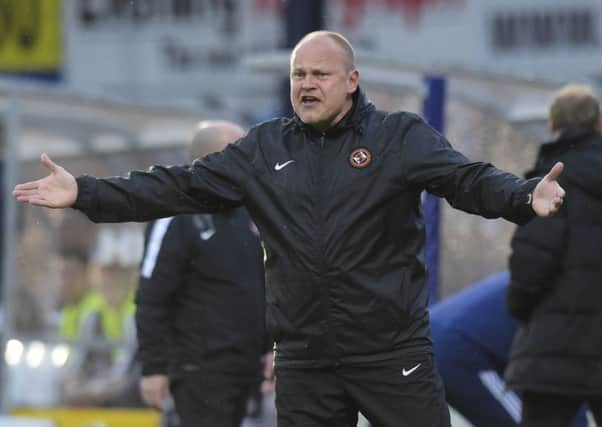Terry Butcher tells Dundee United to stand by Paatelainen


But while Butcher accepts that the buck inevitably stops at the manager’s door when a club fails, he believes a greater degree of courage in the boardroom can often provide a better platform for immediate recovery.
The former England and Rangers captain suffered relegation from Scottish football’s top flight twice as a boss – with Inverness Caledonian Thistle in 2009 and Hibs in 2014.
Advertisement
Hide AdAdvertisement
Hide AdOn the first occasion, Inverness stuck by Butcher who took them back up at the first attempt. But defeat to Hamilton in the play-offs with Hibs two years ago saw him sacked, albeit not before he had released a raft of players in anticipation of being able to rebuild the squad at Easter Road.
“It’s a bit of deja vu for me, to see what’s happening with Mixu at United,” said Butcher. “Although he only took over in October, he knows better than any new man coming in what is required this summer.
“There are going to be cuts and budgetary things, obviously – that invariably happens when you get relegated. When I was at Hibs, I was able to do that work, release players, clear the decks, which was a horrible job but had to be done in preparation for bringing a new squad through.
“I can see boards saying ‘What do we do here? Someone’s got to go, someone’s got to pay for it’. You can’t sack players. It takes a very brave board to keep a manager on who has taken them down.
“It takes a very brave board to look beyond relegation and say ‘How can we come back from this?’ You would have to ask them if they want to deflect the blame but that’s what it looks like.
“You always know from a manager’s point of view that if the chairman or board are getting stick then that invariably filters down to you and action is taken. You try not to get anywhere near that position but sometimes that doesn’t happen.
“I’m not moaning about it, that’s what happens. That’s football. At Hibs I moved players on at the end of the season which was very hard but I felt it was right for the club. I’d already gone down that road and then I was released after I’d cleared the decks.
“I alluded to it many times that we were left with a very small group of players and it was disappointing when you speak to players and release them and you’ve got a strategic plan that you’re working to which is never allowed to grow and develop.
Advertisement
Hide AdAdvertisement
Hide Ad“Mixu hadn’t even got to the stage I was at in terms of releasing players. He said on Monday night after they were relegated that he had a plan and knew what he wanted to do. I would have hoped the board would have listened to him to hear what he had to say and at least have given him the opportunity to plead his case.
“When I was at Inverness we went down and were in a position where we could carry on with the squad we had, add one or two and we got up the next year.
“But we were fourth in the table around Christmas time which wasn’t an ideal position to mount a promotion charge. I could easily have been sacked then because it wasn’t what we wanted and it certainly wasn’t what we expected.
“But patience was a virtue at the club and we came good after that. Getting used to the First Division, as it was then, took a bit of time but we still managed to get back up at a time when only one team went up.”
One notable similarity between Butcher’s seven-month tenure at Hibs and Paatelainen’s time with United was their early public criticism of the players they had inherited.
Many observers believe that backfired on Butcher at Easter Road, prompting a slackening in the commitment of the squad which slipped into relegation trouble.
“Mixu’s a bit like me that way and both Hibs and United got relegated, so you might say it’s not the right approach,” reflected Butcher.
“But you do it for the right reasons. You have the stick or the carrot – which one do you use to get the best out of them and to get the club out of the situation? I’ve always been outspoken as a person and as a player, that wasn’t going to change.
Advertisement
Hide AdAdvertisement
Hide Ad“But football’s changed – you can’t shout and scream at players now. Down south in particular, you speak to academy people and they don’t say anything on the sidelines – and because they don’t say anything on the sidelines, they don’t say a lot on the pitch as well. A lot of the talking’s gone out of the game.
“But as for getting the best out of them, you give them days off, you give them double sessions, you work them hard, you try whatever you can. Mixu had injuries to players in key positions and once you get on a run of poor performances and defeats it’s tough to get out of that. It’s easier when you’re on a good run, you can pick it up easier.”
l Terry Butcher was speaking at a William Hill media event. William Hill is the proud sponsor of the Scottish Cup.